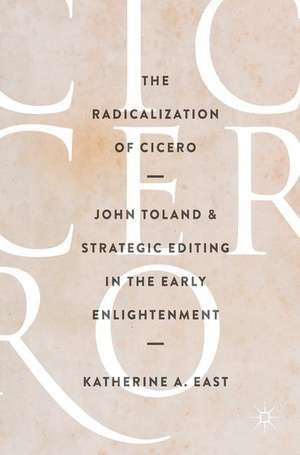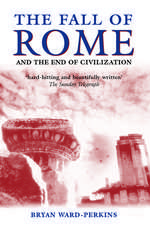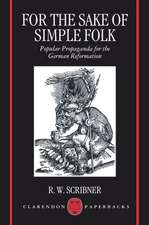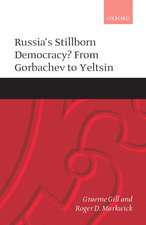The Radicalization of Cicero: John Toland and Strategic Editing in the Early Enlightenment
Autor Katherine A. Easten Limba Engleză Hardback – 10 iul 2017
This book uses a previously overlooked Neo-Latin treatise, Cicero Illustratus, to provide insight into the status and function of the Ciceronian tradition at the beginning of the eighteenth century, and consequently to more broadly illuminate the fate of that tradition in the early Enlightenment. Cicero Illustratus itself is the first subject for inquiry, mined for what its deliberately erudite and colorfully polemical passages of scholarly stratagems reveal about Ciceronian scholarship and the motives for exploring it within the context of early Enlightenment thought. It also includes an analysis of the role played by the Ciceronian tradition in the broader political and radical movements that existed in the Enlightenment, with particular attention paid to Cicero’s unexpectedly prominent position in major political and philosophical Republican and Erastian works. The subject of this book together with the conclusions reached will provide scholars and students with crucial new material relating to the classical tradition, the history of scholarship, and the intellectual history of the early Enlightenment.
| Toate formatele și edițiile | Preț | Express |
|---|---|---|
| Paperback (1) | 581.79 lei 6-8 săpt. | |
| Springer International Publishing – aug 2018 | 581.79 lei 6-8 săpt. | |
| Hardback (1) | 587.20 lei 6-8 săpt. | |
| Springer International Publishing – 10 iul 2017 | 587.20 lei 6-8 săpt. |
Preț: 587.20 lei
Preț vechi: 690.83 lei
-15% Nou
Puncte Express: 881
Preț estimativ în valută:
112.36€ • 117.63$ • 92.97£
112.36€ • 117.63$ • 92.97£
Carte tipărită la comandă
Livrare economică 05-19 aprilie
Preluare comenzi: 021 569.72.76
Specificații
ISBN-13: 9783319497563
ISBN-10: 3319497561
Pagini: 283
Ilustrații: XIV, 283 p. 5 illus.
Dimensiuni: 148 x 210 mm
Greutate: 0.51 kg
Ediția:1st ed. 2017
Editura: Springer International Publishing
Colecția Palgrave Macmillan
Locul publicării:Cham, Switzerland
ISBN-10: 3319497561
Pagini: 283
Ilustrații: XIV, 283 p. 5 illus.
Dimensiuni: 148 x 210 mm
Greutate: 0.51 kg
Ediția:1st ed. 2017
Editura: Springer International Publishing
Colecția Palgrave Macmillan
Locul publicării:Cham, Switzerland
Cuprins
1. Introduction.- I. Editing Cicero.- 2. The Editorial Project.- 3. The Book: Constructing the Edition.- 4. The Author: Composing the Prefatory Life.- 5. The Words: Criticising the Text.- 6. The Commentary: Interpreting the Text.- II. Interpreting Cicero.- 7. Toland’s Ciceronianism.- 8. The Commonwealthman: Cicero and Toland’s Republican Discourse.- 9. The Rationalist: Cicero and Toland’s War on Priestcraft.- 10. Conclusion.
Notă biografică
Katherine A. East is the Leverhulme Early Career Fellow at Newcastle University, UK.
Textul de pe ultima copertă
This book uses a previously overlooked Neo-Latin treatise, Cicero Illustratus, to provide insight into the status and function of the Ciceronian tradition at the beginning of the eighteenth century, and consequently to more broadly illuminate the fate of that tradition in the early Enlightenment. Cicero Illustratus itself is the first subject for inquiry, mined for what its deliberately erudite and colorfully polemical passages of scholarly stratagems reveal about Ciceronian scholarship and the motives for exploring it within the context of early Enlightenment thought. It also includes an analysis of the role played by the Ciceronian tradition in the broader political and radical movements that existed in the Enlightenment, with particular attention paid to Cicero’s unexpectedly prominent position in major political and philosophical Republican and Erastian works. The subject of this book together with the conclusions reached will provide scholars and students with crucial new material relating to the classical tradition, the history of scholarship, and the intellectual history of the early Enlightenment.
Caracteristici
Appeals to students and scholars of the history of classical scholarship and radical philosophies in Enlightenment England Introduce material previously neglected intellectual and cultural influences on the early Enlightenment Provides exceptional and thorough contextual accounts of the influence Cicero played on major political and philosophical thoughts in the sixteenth and seventeenth centuries Includes supplementary material: sn.pub/extras
















